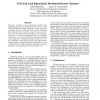3202 search results - page 17 / 641 » Memory access scheduling |
124
Voted
CISS
2008
IEEE
15 years 9 months ago
2008
IEEE
— We develop distributed scheduling schemes that are based on simple random access algorithms and that have no message passing. In spite of their simplicity, these schemes are sh...
111
Voted
ICPP
1999
IEEE
15 years 7 months ago
1999
IEEE
This paper describes a novel compile-time list-based task scheduling algorithm for distributed-memory systems, called Fast Load Balancing (FLB). Compared to other typical list sch...
124
Voted
CC
2002
Springer
15 years 2 months ago
2002
Springer
Global variable promotion, i.e. allocating unaliased globals to registers, can significantly reduce the number of memory operations. This results in reduced cache activity and less...
132
Voted
JSSPP
2000
Springer
15 years 6 months ago
2000
Springer
Abstract. Buffered coscheduling is a new methodology that can substantially increase resource utilization, improve response time, and simplify the development of the run-time suppo...
135
click to vote
SAC
2008
ACM
15 years 2 months ago
2008
ACM
To use multiple memory banks in parallel is a nature approach to boost the performance of flash-memory storage systems. However, realistic data-access localities unevenly load eac...

